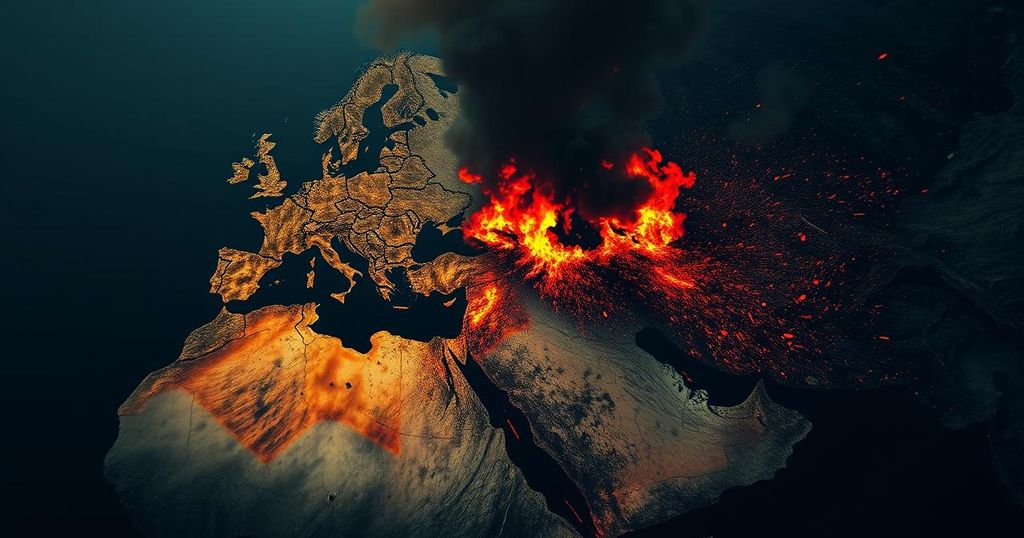Iranian-linked militias in Iraq have significantly increased their attacks on Israel, responding to Hezbollah’s weakened position amid ongoing conflicts in Gaza and Lebanon. Following the killing of Hezbollah’s leader, Iranian support has shifted towards lesser-known groups to retaliate against Israel. The situation illustrates Iran’s strategy of empowering its proxy network in the face of Israeli operations across the region, highlighting an intricate web of military and diplomatic tensions.
In recent weeks, Iranian-affiliated militias in Iraq have escalated their acts of aggression towards Israel, launching approximately 40 missile, drone, and rocket assaults over the past two and a half weeks. This intensification follows a period of attacks that started concurrently with the Gaza conflict last October and has notably surged since the Israeli airstrike that killed Hezbollah’s leader, Hassan Nasrallah, on September 27. As Hezbollah grapples with mounting pressure following ongoing Israeli military operations in Lebanon, Iran appears to be mobilizing less prominent factions within its established coalition to engage in attacks against Israel. Michael Knights, an analyst at the Washington Institute, articulates that the increase in missile and drone fire from Iraq signifies a commitment to bolster Hezbollah during its challenging period. However, Knights points out that these Iraqi militias lack the capabilities of Hezbollah and express concerns regarding being overshadowed by the Houthis, another Iranian ally. Iran’s strategy emphasizes mutual support among its militant proxies, fostering competition while also presenting a united front against Israel. The conflict dynamics in the region are complex, with the potential for Israeli retaliation against Iran’s proxies across Syria, Iraq, and Yemen. Israel has been actively targeting Iranian-affiliated sites, executing airstrikes and ground assaults to disrupt supply lines crucial for Hezbollah. Notable strategic operations have included raids on weapons production facilities in Syria and precision strikes on key targets related to Iran’s military apparatus. Despite frequent engagements, Israel has not conducted strikes in Iraq itself, although it has targeted Iraqi militia leaders in Syrian territories. Recent hostile exchanges have also involved attacks against United States military personnel, indicating the broader implications of this regional conflict. Furthermore, developments suggesting collaboration between the Iraqi militias and the Houthis signal the expanding scope of Iranian influence and its proxies’ interconnectivity throughout the region. Israel’s military leadership remains vigilant, indicating a preparedness to address the evolving threat. Nonetheless, vital confrontations, such as those occurring in Iraq and Syria, continue to receive insufficient attention from global media and policymakers, as Michael Knights poignantly notes, “Every big war has its forgotten corners.”
The topic centers around the escalating conflict involving Iranian-proxy militias in Iraq targeting Israel, which reflects a broader proxy war occurring in the Middle East. This particular situation has intensified following Israel’s actions against key figures in Hezbollah and amid the ongoing Gaza conflict. Understanding the dynamics of this proxy warfare is crucial to comprehending the regional balance of power, the strategies employed by Iran to exert influence, and the response from Israeli military forces. The intricate relationships between various militia groups and their respective capabilities illustrate the complexities of regional security and the implications of these confrontations on international relations.
In conclusion, the recent surge in attacks from Iran-linked militias in Iraq against Israel underscores the intricate and volatile nature of Middle Eastern politics and military dynamics. As proxy warfare intensifies with the inclusion of lesser-affiliated factions backing Hezbollah, the potential for broader conflict and retaliatory actions remains significant. The ongoing engagements highlight the need for global awareness and understanding of these often-overlooked theaters of conflict, as they fundamentally influence regional stability and security strategies.
Original Source: www.theguardian.com






